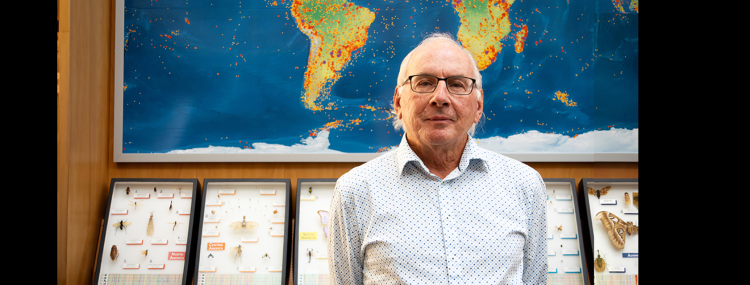Dr. Paul Hebert, a University of Guelph professor who revolutionized the field of biodiversity science as the creator of DNA barcoding, is the recipient of the 2025 Sustainability Award for Outstanding Research and Development in Biodiversity from the Nobel Sustainability Trust.
Hebert, an evolutionary biologist and CEO of the Centre for Biodiversity Genomics (CBG), is the first North American to receive a Nobel Sustainability Trust award, which recognizes breakthroughs in science and implementation.

Dr. Paul Hebert is an evolutionary biologist, University of Guelph professor and CEO of the Centre for Biodiversity Genomics.
A prestigious honour, the Sustainability Awards build a bridge from scientific research to applied projects and international political initiatives. The goal, to develop a sustainable economy and society, reflects U of G's ethos to improve life for all the planet's inhabitants.
The Sustainability Award for Outstanding Research and Development in Biodiversity recognizes the innovative and technological impact of research that has potential for practical solutions and business opportunities.
Global impact of groundbreaking DNA-based systems
Hebert's groundbreaking work in DNA-based identification systems has made the discrimination of species faster, more accurate and less expensive. The same way a barcode identifies a product at a store, Hebert uses short DNA sequences to discriminate species.
"It is a very great honour to receive this award from the Nobel Sustainability Trust," Hebert says. "However, I cannot emphasize strongly enough that my capacity to contribute to the preservation of planetary biodiversity is only possible because of my colleagues at the CBG and an international alliance of collaborators."
At CBG, Hebert leads a team of more than 100 researchers who are registering planetary biodiversity at a pace that is 20-fold faster than previously achieved.
The CBG has doubled its production of barcode records every five years since 2005 and intends to sustain this growth trajectory. In January, it will launch a new project, LINNAEUS 2x (L2x), which will barcode 30 million more specimens by 2031, an effort that should double the number of species which have gained scientific registration.
L2x will be followed by Planetary Biodiversity, the first mega-science project in this field. It will register all multi-cellular species by 2045, an advance which will enable activation of the global biomonitoring system needed to better protect biodiversity.
Advancing CBG's work with first mega-science project
The centre's sequencing capability has supported organizations across the globe, as it has partnered with researchers in more than 50 countries to make possible the effort to catalogue all life on Earth through the International Barcode of Life Consortium (iBOL).
In Aurangabad, India, the Paul Hebert Centre for DNA Barcoding and Biodiversity Studies is modelled after CBG, reflecting its impact as a global leader. Earlier this year, CBG scientists were invited to train graduate students and selected delegates on the DNA barcoding workflow in Peru and Ghana, critical regions in the Global South where much of the world's biodiversity lives.
"Congratulations to Dr. Hebert for this well-deserved recognition of the impact he has on the field of biodiversity research," says Dr. Mazyar Fallah, dean, College of Biological Science. "Hebert's pioneering innovation of DNA barcoding has empowered people across the world to catalogue, monitor and conserve species. From that idea through today, he has never stopped working towards his vision where the biodiversity of all life on our planet is known and protected."
A professor in the Department of Integrative Biology in the College of Biological Science, Hebert is a Fellow of the Royal Society of Canada and an Officer of the Order of Canada. He received the 2024 Benjamin Franklin Medal in Earth and Environmental Sciences and is the only Canadian researcher to receive the Heineken Prize for Environmental Sciences and the MIDORI Prize for Biodiversity.
The Nobel Sustainability Trust was founded in 2007 to promote sustainable economic growth that preserves and enhances the living systems on the planet. It is run by members of the Nobel family, separate from the Nobel Foundation. Each year, it honours three recipients with a Sustainability Award to recognize their breakthroughs that align with the United Nations Sustainable Development Goals.













